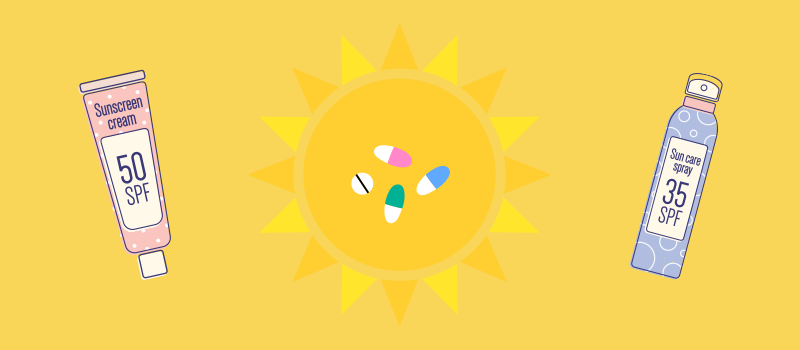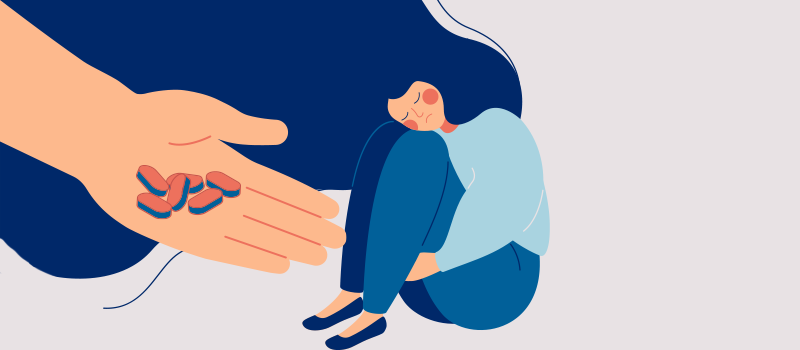What’s the Buzz
The Bee Healthy Blog
Can Stress Cause Stomach Ulcers?

Peptic ulcer disease affects over 4 million people in the United States each year. The condition is characterized by the formation of an open sore in the lining of the stomach and duodenum (upper part of the small intestine). These sores in the gastrointestinal (GI) tract are called gastric ulcers (stomach ulcers) and duodenal ulcers (small intestine ulcers).
The two most common causes of peptic ulcers in the U.S. are infection with bacteria called Helicobacter pylori (H. pylori) and prolonged use of nonsteroidal anti-inflammatory drugs (NSAIDs) such as naproxen sodium (Aleve) and ibuprofen (Advil, Motrin).
Contrary to what many people believe, psychological stress and certain foods like spicy foods do not cause peptic ulcers, but they can make the symptoms worse.
Additionally, there is something called a stress ulcer, which is not caused by minor psychological stress and sometimes referred to as “curling ulcers.” The terminology can be confusing, so please continue reading to learn more. In this article, we will talk about stomach ulcer symptoms and the role of stress and anxiety in peptic ulcer disease.
What are stress ulcers?
The term “stress ulcer” refers to a specific type of ulcer that forms in the stomach lining due to physical stress or physiological stress from a serious infection, serious injuries such as head injury, organ failure, or other serious medical conditions requiring placement on a ventilator or admission to an intensive care unit.
A stress ulcer appears quickly and is very common in emergency settings and intensive care units. It is estimated that 75% of patients with head injuries or severe burns develop stress ulcers within 72 hours of the injury. For this reason, doctors sometimes give medications for stress ulcer prophylaxis (prevention) to severely ill patients.
In contrast, peptic ulcers (gastric and duodenal ulcers) typically develop gradually due to the long-term use of nonsteroidal anti-inflammatory drugs (NSAIDs) or Helicobacter pylori infection.
Can anxiety and stress cause stomach ulcers?
The medical community continues to debate whether chronic stress and anxiety can cause stress ulceration. A gastric ulcer is not believed to be the direct consequence of mental or emotional stress. However, experts agree that emotional stress can worsen the symptoms of peptic ulcer disease.
On the other hand, it is well known that chronic stress and anxiety can lead to hormonal imbalances, which in turn can lead to increased stomach acid production and eventually cause ulcerations in the lining of the stomach and duodenum.
Also, stress and anxiety are linked to sleep difficulties. Lack of proper sleep can wear the body down and make it harder for the body to repair tissue, including repairing the gastrointestinal tract lining.
There are also some anecdotal reports of severe psychological stress triggering stress ulcers. Some studies have found that people with high-stress levels are more than twice as likely to receive treatment for H. pylori or be diagnosed with a stomach or duodenal ulcer compared to people with lower levels of perceived stress. Therefore, while there may not be a direct causative link, an association between stress and digestive health is present.
What does a stress stomach ulcer feel like?
Minor peptic ulcers and stress ulcers may not cause any symptoms. Severe ulcers can cause various symptoms, with the most common symptom being intense pain. It is worth noting that people with stress ulcers are already severely ill, so it can be difficult to tell where the symptoms are coming from.
Symptoms of peptic ulcers or stress ulcers can include:
- Abdominal pain in the upper portion of the stomach
- Pain that’s related to eating (gets worse or better with food)
- Bloating
- Nausea
- Vomiting
Some stomach ulcers can lead to a dangerous loss of blood which can be life-threatening. Symptoms of internal bleeding due to a bleeding ulcer may include:
- Pale skin, shortness of breath, lightheadedness, or fainting (these are symptoms of blood loss and anemia in people with bleeding ulcers)
- Blood tinged or coffee grounds vomit
- Bloody stools
- Dark, tarry stools
You must seek immediate medical attention if you have any of these severe signs and symptoms.
How do doctors diagnose and treat peptic ulcers?
Infection with H. pylori bacteria is a major risk factor for peptic ulcer disease. An H. pylori infection can be diagnosed with a breath test, blood tests, and stool tests.
Your doctor needs to see your gastrointestinal tract to diagnose an actual ulcer. This can be accomplished with an endoscope, a thin, flexible tube with a tiny camera.
The treatment plan for a peptic ulcer or stress ulcer depends on the cause and severity of the ulcer. Patients with H. pylori are treated with antibiotics. Those with serious bleeding may need a blood transfusion to replace lost blood. The goal of ulcer treatment is ultimately to reduce stomach acid and bleeding.
The various treatment options for stomach ulcers include:
- Proton pump inhibitors (PPIs): These drugs block stomach acid secretion. They are available as both over-the-counter medications and by prescription. Examples include omeprazole (Prilosec, Zegerid), esomeprazole (Nexium), pantoprazole (Protonix), lansoprazole (Prevacid), dexlansoprazole (Dexilant), and rabeprazole (Aciphex).
- Histamine blockers: These drugs reduce the amount of stomach acid produced by countering the activity of acetylcholine which stimulates acid formation in the stomach. Examples include cimetidine (Tagamet HB), famotidine (Pepcid AC), and nizatidine (Axid AR).
- Antibiotics: A combination of 3 medications (triple therapy) is used to treat H. pylori infections in the digestive tract. These medications include antibiotics such as amoxicillin (Amoxil), clarithromycin (Biaxin), and others, a proton pump inhibitor, and bismuth subsalicylate (Pepto-Bismol).
- Antacids: Over-the-counter antacids (Maalox, Mylanta, Pepto-Bismol) help neutralize stomach acid and provide pain relief; however, they do not heal an ulcer.
- Protective medications: Drugs like sucralfate (Carafate) and misoprostol (Cytotec) are sometimes prescribed because they form a barrier that protects the stomach lining.
The Takeaway
Peptic ulcers are sores in the digestive tract lining (stomach or upper portion of the small intestine). They develop most commonly due to an infection with H. pylori bacterium or prolonged NSAID use.
People who are severely ill are at increased risk of developing stress ulcers, which form rapidly after a severe injury or illness and are commonly seen in intensive care settings.
The link between peptic ulcers and stress or certain foods is unclear. Experts believe that stress or spicy foods do not cause peptic ulcers but can worsen the symptoms. At the same time, ulcers are more common in people with high stress levels. Also, spicy or fatty foods can lead to an increase in stomach acid production.
Therefore, managing stress and eating a bland diet can play an important role in treating peptic ulcer disease, along with medications like proton pump inhibitors, histamine blockers, antacids, and others.
References:
- https://www.ncbi.nlm.nih.gov/pmc/articles/PMC5126869/
- https://www.mayoclinic.org/diseases-conditions/peptic-ulcer/symptoms-causes/syc-20354223
- https://www.ncbi.nlm.nih.gov/pmc/articles/PMC6207812/
- https://www.medscape.com/answers/181753-13866/what-is-the-prevalence-of-peptic-ulcer-disease-pud-in-the-us#











SOCIAL